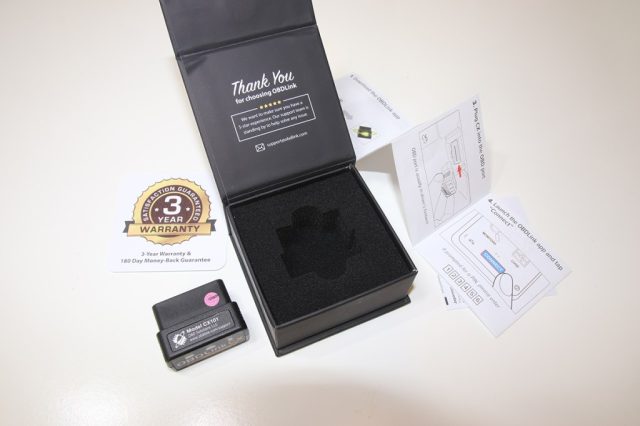US-based OBDLink sells three Bluetooth scanners, all of which are plugged into the OBD2 port. Looking at OBDLink’s website, the company appear to have thought of everything and they provide an impressive overview of what they can offer. This CX model is their entry-level product and is also the cheapest. So is it any good? Let’s find out.
How I tested the OBDLink CX Bluetooth scanner
I had a couple of cars ready and waiting to plug the OBDLink CX into their OBDII ports. On one of the cars, a 2005 Audi A3 Sportback, I knew there was an issue with a parking sensor. Would the Bluetooth scanner find it? And on another, a 2006 Ford Focus, the passenger window would wind down, but not back up. Was there a calibration issue the OBDLink CX could fix?
I was also interested in looking at live data. This can help to diagnose problems by looking at the behavior of the engine.
RRP: From $79.99 Buy or £78 Buy.
Using the OBDLink CX
What’s in the box?
The OPBDLink CX is supplied in a small durable box that’s roughly three inches wide and long and a little over one inch deep. It even has a magnetic lock on its lid. Inside, I found a warranty card (three years), a small user guide with clear instructions in English and the device. OBDLink is clearly keen to show it values its customers. Inside the lid of the box, there’s a thank you message and email address for the support team. The aforementioned warranty card clearly states it’s three years long, but there’s also a 180-day money-back guarantee. The user manual asks you to leave reviews if you like the product. And provides links if you don’t.
Downloading the app
This is one of the quickest and easiest app installs I’ve seen. After scanning a QR code in the user manual using my phone, the 25MB dedicated app was quickly installed and opened. Not only that, but the user manual couldn’t have made it simpler. Downloading was step 1 of 5. It was hard to go wrong.
Connecting app and OBDLink CX scanner
Worryingly, the user manual explains to start the engine, then plug in the OBDLink CX into the OBDII port. Anyone used to communicating with a car’s ECU will know this isn’t the norm. Usually, the device is plugged into the OBDII port, then the ignition is switched on, but the engine not run. I realized I had to follow the instructions to test them out. But what if it all went wrong? It didn’t. Instead, I then launched the OBDLink app and pressed Connect on the main menu screen.
Connecting the app and scanner took a couple of attempts, but it was soon established. Plus, that connection remained reliable throughout testing.
Using the app
There are no instructions in the small user manual for using the app and I can see why. It’s so simple to use. The main menu screen has some clearly labelled options.
I was amazed to see that the Diagnostics feature quickly revealed no fault codes. Perhaps it had already scanned everything on the car. However, it didn’t pick up the parking sensor fault, which hadn’t raised the EML. Maybe the Diagnostic feature only lists faults where the EML is illuminated.
I soon discovered some features require an in-app purchase.
I liked the Dashboard feature, which provided live data readouts of engine rpm, speed, coolant temperature and several others. Some of this data can be displayed as a graph, which helps to analyze readings and engine behavior.
One feature that is really impressive is the Map function. This enables a car journey to be logged, showing where it goes and how it performs.
OBDLink has developed its Bluetooth scanners to be compatible with other third-party apps, such as Torque, Carista and BimmerCode. Some of these are entirely free to use, whereas others require in-app purchases. I was, however, impressed with the versatility of the standard app, which can run on an iPhone with iOS 9 or later or an Android phone with version 4.4 or later. The app can even run on a Windows phone (version 8), and an Amazon Kindle Fire!
OBDLink CX verdict
For an introduction into engine diagnostics and analysis, the OBDLink CX is a budget-priced option. Its diagnostic tools are limited, but perhaps sufficient for a novice. And the dashboard, map and live data features provide an overview of how a car is performing.
Be sure to check out the best Bluetooth OBD2 scanners in 2023.
The post OBDLink CX Bluetooth OBD2 Scanner Review appeared first on Fast Car.







